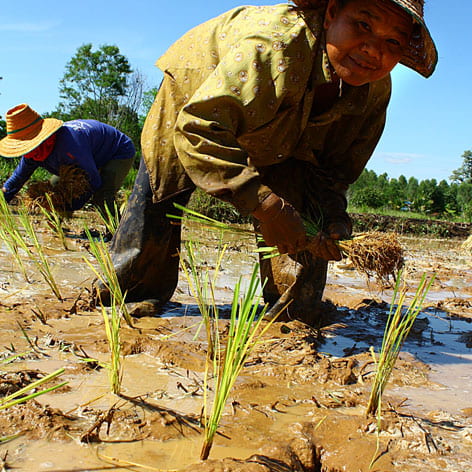Stopping the spread of infectious diseases
UCI research on infectious diseases, such as dengue fever, HIV and meliodosis, could benefit millions worldwide.

Southeast Asia’s rich soil yields the bulk of the world’s rice crop. It also harbors infectious bacteria that cause a potentially fatal disease called melioidosis.
Burkholderia pseudomallei can easily spread to people in wet rice paddies and during the annual monsoon season, putting millions — especially children and farmers — at risk. Philip Felgner, a project scientist in the UC Irvine Department of Medicine’s infectious diseases division, has made a key discovery that one day might stop this bacterium and curtail melioidosis.
Working with Thai and British researchers, Felgner identified B. pseudomallei antigens — proteins targeted by immune-system antibodies to kill the bacteria and block infection.
“If a person gets infected, the chances of dying from melioidosis are high, and many cases are misdiagnosed and improperly treated,” Felgner says. “Hopefully, this research can lead to improved diagnostic tools that allow public health officials to control this infectious bacterial disease and create vaccines to someday eradicate it.”
Felgner’s lab developed a microarray technology to probe thousands of proteins at one time to find those that produce antibodies in infected people. For this study, he created a microarray of nearly 2,000 B. pseudomallei proteins to which he applied blood serum derived from 747 melioidosis patients around the world.
He used a number of the reactive proteins identified in the microarray to devise a diagnostic dipstick that confirmed the presence of melioidosis in blood samples from these patients. The study was published online July 28 in the Proceedings of the National Academy of Sciences.
Felgner has also employed this technology — which he says is being increasingly utilized in vaccine development — to identify the reactive proteins of tularemia, an infectious disease better known as rabbit fever.
His work is part of UCI’s growing and well-financed research efforts on infectious diseases. The campus is home to the Pacific Southwest Regional Center of Excellence for Biodefense & Emerging Infectious Diseases Research, one of only 11 federally funded research sites dedicated to countering bioterrorism and infectious disease threats.
Felgner is one of the Pacific Southwest researchers, who are at UCI and 18 other universities and institutes in California, Arizona, Nevada and Hawaii. The center has received $85 million in federal funding since opening in 2005. Besides Felgner’s work, its research efforts include:
- Improving protection against and treatment of dengue fever, a mosquito-transmitted viral disease that infects millions worldwide;
- Improving knowledge about and vaccine development for bacterial and viral diseases carried by animals and acquired by humans; and
- Improving detection of and vaccine development for coccidioidomycosis (also known as valley fever), a fungal disease found in parts of the southwestern U.S. and in northern Mexico.
In addition, other researchers in the UCI Department of Medicine’s infectious diseases division are working to better understand and potentially treat sexually transmitted diseases like HIV and chlamydia.
Earlier this year, division chief Dr. Donald Forthal received a $427,000 federal grant to investigate how antibodies recruit and stimulate immune-system cells to fight the AIDS-causing virus. With UCI pathologist Ellena Peterson, he is also trying to identify compounds for use as topical antimicrobial agents to block sexually transmitted HIV infection.
“There are more opportunities for research because of an increased commitment from funding sources like the National Institutes of Health and the Gates Foundation,” Felgner says. “They’re supporting work that can save millions of lives around the world from viral and bacterial illnesses. This is a very exciting time to be doing infectious disease research.”